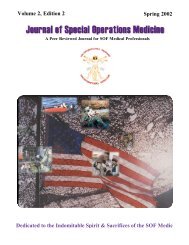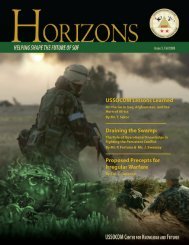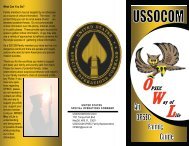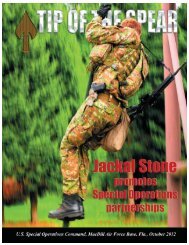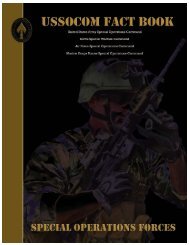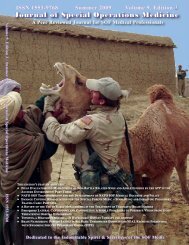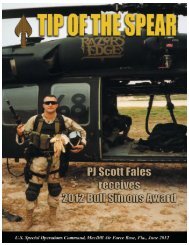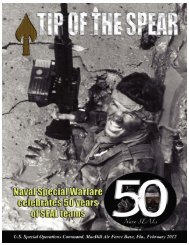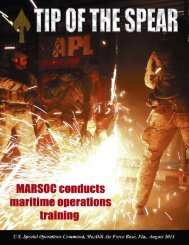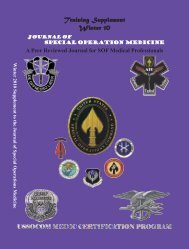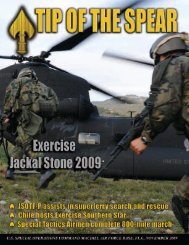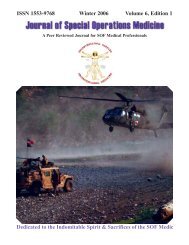HQ$History - United States Special Operations Command
HQ$History - United States Special Operations Command
HQ$History - United States Special Operations Command
You also want an ePaper? Increase the reach of your titles
YUMPU automatically turns print PDFs into web optimized ePapers that Google loves.
Since 2004, U.S. SOF and conventional<br />
forces have trained and worked with tribal<br />
forces to build capacity and capabilities.<br />
Although the tribal forces’ tactical offensive<br />
strikes received much attention, the real power<br />
of tribal engagement, and the subsequent Sons<br />
of Iraq program, was creating local tribal security<br />
forces that could, with backup from U.S. and<br />
Iraqi military forces, defend their local areas<br />
against AQI. Their security activities had decisive<br />
operational and strategic effects by driving<br />
the terrorists and insurgents out of safe havens<br />
in Anbar Province. The former Desert<br />
Protectors, after returning home, did just that<br />
when many joined the local police and continued<br />
to enhance local security.<br />
Confronted with a brutal AQI occupation,<br />
the tribal sheikhs had ample reasons to look for<br />
alternatives. By 2006, the U.S. and Iraqi government<br />
policy toward the tribes was more sympathetic<br />
than it had initially been. In late 2005<br />
and early 2006, U.S. conventional forces in<br />
Anbar improved the counterinsurgency operations<br />
in several ways. The U.S. military leadership<br />
pushed more U.S. forces into Anbar<br />
Province, which made the coalition more of a<br />
viable long-term force that could win against<br />
AQI. Even more important, coalition forces put<br />
more emphasis on providing security for local<br />
civilians. U.S. conventional and Iraqi security<br />
forces fanned out to small outposts in populated<br />
areas, where they maintained a presence and<br />
backed up the local police and engaging tribal<br />
leaders outside Iraq.<br />
As tribal engagement gathered momentum<br />
and conventional forces in Anbar Province took<br />
the lead, SOF shifted to a “connect-the-dots” role<br />
of working the seams and pulling together the<br />
many local tribal engagement activities across<br />
the province and in neighboring provinces.<br />
While tribal engagement has helped U.S.<br />
and Iraqi forces dramatically improve security<br />
in Anbar Province, significant challenges<br />
remain. In late 2007, the province still lacked a<br />
functioning Iraqi criminal justice system.<br />
Though the new police forces can detain or<br />
arrest suspects, there was often no functioning<br />
court system or prison to hold convicted criminals.<br />
Here again the tribal justice system was<br />
helpful because a sheikh can pay a “fine” to have<br />
the arrested man released. To avoid having to<br />
pay a fine repeatedly, the sheikh typically either<br />
forced the released detainee to cease his insurgent<br />
activities or leave the area. In extreme<br />
cases, the tribe may even kill a member who<br />
repeatedly brings dishonor on the tribe. Tribal<br />
justice was not a complete substitute for a modern<br />
legal system, but it helped to fill the gap<br />
until a fully functional Iraqi justice system<br />
emerged in Anbar Province.<br />
As in Afghanistan, the evolution of SOF roles<br />
and missions in Iraq continues. SOF will remain<br />
at the forefront of targeting specific terrorists in<br />
Iraq. While SOF has earned countless accolades<br />
for its successes in eliminating specific persons,<br />
its chief contribution over time will undoubtedly<br />
prove to be its investment in building the Iraqi<br />
security forces. As SOF expands the capability of<br />
Iraqi units, however, it will increasingly conduct<br />
its targeting by, with, and through Iraqi forces.<br />
As a combat multiplier, SOF have proven enormously<br />
successful in preparing Iraqi units to<br />
defeat the insurgency. Continued success would<br />
most likely hinge on SOF’s ability to employ this<br />
indirect approach: to apply components of FID,<br />
IO, and CMO to legitimize specific security and<br />
government institutions in Iraq.<br />
Further Readings<br />
Briscoe, Charles H., et al, All Roads Lead to Baghdad: Army <strong>Special</strong> <strong>Operations</strong> Forces in Iraq,<br />
GPO, 2006.<br />
USAJFKSWCS, <strong>Special</strong> Warfare 2003-2008.<br />
USSOCOM, <strong>Special</strong> <strong>Operations</strong> Forces: Operation IRAQI FREEDOM, May 2003.<br />
USSOCOM, Tip of the Spear, 2003-2008.<br />
137



